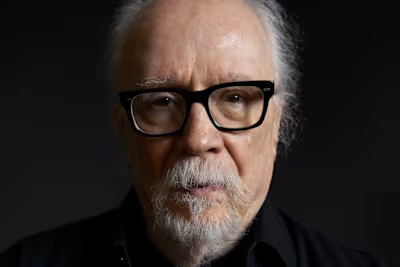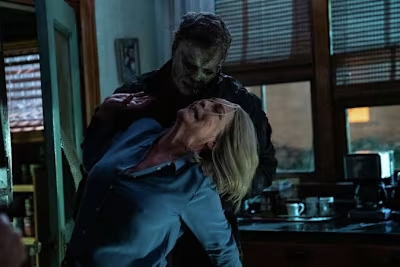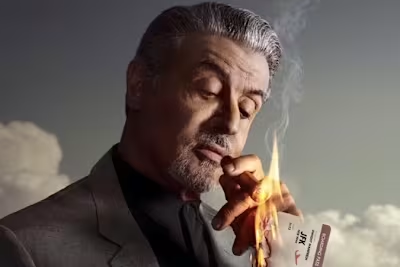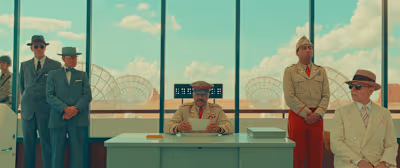Walter Hill on Making the Unwoke Western Dead for a Dollar
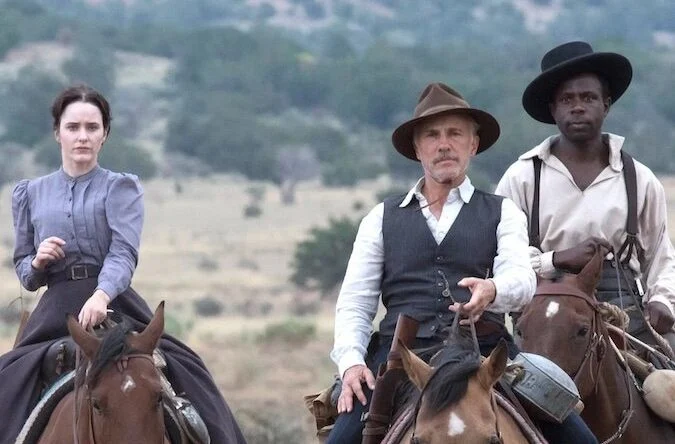
Walter Hill on Making the Unwoke Western Dead for a Dollar
Walter Hill says a lot in a few words, but when you remove sound and tone, his words can read more tersely than they sound. Fortunately his work speaks for itself, from The Driver to The Warriors to 48 Hrs. to the Deadwood pilot. So does his latest, Dead for a Dollar.
Hill was there in the early days of TV Westerns — he even worked on Gunsmoke — and Dead for a Dollar marks his return to the genre. He directs and co-wrote the film, which stars Christoph Waltz as Danish bounty hunter Max Borlund, who travels deep into Mexico and encounters professional gambler and outlaw Joe Cribbens (Willem Dafoe), a man he sent to prison years earlier. When the truth about Borlund’s latest bounty is revealed, he has to decide if he should follow his conscience or finish the job.
Dead for a Dollar honors the tradition and hallmarks of the Western, while addressing modern issues. But Hill declined to impose modern morals on his characters.
“I thought that I would anchor the issues of race and feminine possession in a man’s world within the period of that time, and not have a 2022 debate. I wanted an 1897 debate,” says Hill. “I think that’s only fair to the audience and the characters.”
He wants to acknowledge injustice. But at the same time, he says, “This woke environment, politically correct environment, is a terrible thing.”
The 80-year-old filmmaker, who last month became the second recipient of the Venice Film Festival’s Cartier Glory to the Filmmaker Award, spoke with us about reuniting with Willem Dafoe, 38 years after introducing the actor to Hollywood in Streets of Fire 38 years ago. He also shared his thoughts about Yellowstone, and revisits The Assignment, six years after its divisive debut. (Indiewire called the film, about a hitman turned into a woman by a vengeful doctor, “exploitative, insulting and dangerous to trans people.”) Hill also talks about why he likely won’t be actively returning to the Alien franchise. He produced the original 1979 Alien, co-wrote Aliens and Alien 3, and is credited as a producer on every Alien film, though he says he and Alien 3 director David Fincher “came to a parting of the ways with Fox” after the film, which Fincher has disavowed. Here’s our talk.
Joshua Encinias: Why did you want to make a western 16 years after your last one (the TV mini-series Broken Trail)?
Walter Hill: Oh, it’s fun to do, really. I’ve always been very comfortable doing Westerns. The first jobs I ever had were on Westerns. I was a production assistant on Gunsmoke and Wild Wild West. I like the atmosphere around Westerns, I like to be around the horses. I like the costumes. I always liked the movies when I was a kid. I think they’re the most American of genres. Although I will say this, and I say this in a positive way, as a salute: the Italian Westerns of the ’60s and ’70s turned the Western into a world genre rather than a particularly American genre. And that is to their credit.
Joshua Encinias: It’s been 38 years since you worked with Willem Dafoe on Streets of Fire and he doesn’t miss a beat in Dead for a Dollar. Was working with him different this time?
Walter Hill: I’ve been very friendly with Willem since we did Streets of Fire. We had a good time on the film. He did a good job. He’s been overly thankful to me, but it was his first Hollywood movie. I brought him out to New York to play the part of Raven and it really got his career going. He’s a very loyal guy. We’ve talked about doing films together over the years, for a long time, and trying to figure it out. Time, circumstance, and availability are tricky in this business. I very much created this role for him. I wanted a suitable opponent, having decided the bounty hunter [the Christoph Waltz character, Max Bourland] should be a Dane . We wanted somebody that was capable of standing up to him, but seemed like he was in the same world and a dramatic opposite in many ways. Willem plays it as a very American character. It’s been fun to work with him. Both Christoph and Willem are consummately professional.
Joshua Encinias: I think the last time a Western received acclaim in Hollywood was No Country for Old Men and Deadwood a few years before it. But right now, the most popular show on TV is Yellowstone and its spin-offs. Have you seen it?
Walter Hill: When we say Western, we mean different things. To the strictest definition, a Western is something that happens between the end of the Civil War and the turn of the century. Yellowstone is marvelously entertaining, but it’s a modern story with modern issues in a Western setting. It’s very contemporary. So to some people, it’s a Western, and to other people, it’s a drama set in the current American West. But it’s very entertaining and a lot of fun. It’s very well done melodrama.
Joshua Encinias: Let’s talk about your unused script for Alien 5.
Walter Hill: I was talking to Sigourney [Weaver] and I had an idea to bring her character back in an isolated circumstance. Try to revisit the atmosphere of the first Alien. But again, it generated no interest. So there you have it.
Joshua Encinias: There’s been a lot of talk online about Disney being uninterested in your script. Did you see Sigourney at the Venice Film Festival?
Walter Hill: We had dinner together and talked. I think it was the night before Dead for a Dollar screened. But we didn’t have dinner about that idea. I can only say this, we were both surprised at how little enthusiasm it raised with the studio and the people that are currently running the franchise.
Joshua Encinias: Why do you think they didn’t want the script?
Walter Hill: I have not had anything to do with the Alien franchise since the third one. David Fincher and I came to a parting of the ways with Fox — they called it a divorce. In the agreement, Fox insisted that our names still be used in association with the franchise. A lot of what they’ve done since then I haven’t seen. I’ve seen the ones Ridley [Scott] did, but I haven’t seen Alien vs. Predator, that kind of stuff.
Joshua Encinias: When you’re choreographing a dangerous car chase, like those in The Driver, how do you garner goodwill with your collaborators when you’re asking them to take a risk?
Walter Hill: Well, they’re the ones taking the risk. I’m sitting back, watching with my fingers crossed. We don’t hire stunt men and we don’t hire actors because they’re expendable. We hire stunt men because they know how to pull off certain effects that we asked for, in a safe way, without getting hurt.
Joshua Encinias: It almost sounds like safety isn’t the director’s responsibility on set.
Walter Hill: The director must be very conscious of the safety factors. The assistant director is the person on set that’s actually in charge of safety. It’s kind of like, the director may be the admiral, but the captain of the ship is the assistant director. An admiral can tell the captain, “Go closer to the rocks.” And the captain can say, “No, it’s not safe. I’m not going to do that, admiral.” The captain is correctly within his bounds of his responsibility. The fact that the other person has a higher position in the chain of command makes no difference at that point.
Joshua Encinias: What is the climate like for young filmmakers today?
Walter Hill: I think the ability to make films can be learned fairly quickly. The real trick is opportunity. I say this to young people: in your pocket, in your iPhone, you have a camera that’s actually a better camera than Jean-Luc Godard and François Truffaut had in 1962. You can put it on a stick and you can edit it at home. We couldn’t do those things when I was young. You can get more information digitally on an image than they could on film at that time. So the question is what you’re shooting. You have to have a piece of material that is worthy of other people’s attention and worthy of actors lending themselves to the project.
Joshua Encinias: Where should a new moviemaker start?
Walter Hill: The first thing is get a script, get a story. Get a story worth doing. If you can’t figure out a way to pay for it, borrow some money from your dad and use your iPhone. Make something for a very low budget because it will be seen. You can get these things seen now.
Joshua Encinias: Do you think that a movie like The Assignment is less likely to be made today?
Walter Hill: The original name of the project was Tomboy. The Assignment was a last-minute attempt to make it more politically correct. What was unfortunate is there’s nothing in the movie that violates trans theory, and it reinforces trans theory. That is to say, what you are inside your head is what you are. But I did not completely understand it was too soon to deal with trans stories in a comic-book style film. We’re still in the phase where it is perceived that it must be treated as hallowed ground. I miscalculated. The woke environment is still very pervasive.
Joshua Encinias: Is there another story that was once hallowed material that’s widely interpreted now?
Walter Hill: Probably the greatest individual tragedy in American history is the death of Abraham Lincoln. But you know, we now feel very free to make jokes about it. There’s the famous joke about his assassination, “Other than that, how did you like to play Mrs. Lincoln?” And at what point does that joke become legitimate? Obviously, it would have been in poor taste in 1865. But when was the line crossed that it becomes such a part of the American experience that it’s open to melodramatic interpretation, comic book interpretation, ironic interpretation? These are good questions. I think the problem with The Assignment was its timing.
Joshua Encinias: Thank you for talking to me today.
Walter Hill: But look, you’re giving me a chance to say this: this woke environment, politically correct environment, is a terrible thing. And it hurts. It is death to the arts and it’s death to creativity. There’s no question that there were injustices in the past. Nobody is arguing that point. But how you redress it is how you treat the future.
Dead for a Dollar is now in theaters, courtesy of Quiver.
Main image: Rachel Brosnahan, Christoph Waltz and Warren Burke in Dead for a Dollar.
Share:
Like this project
Posted Sep 22, 2023
Dead for a Dollar director Walter Hill says the film honors Western traditions, while addressing modern issues — but in 1897 terms.
Likes
0
Views
1


